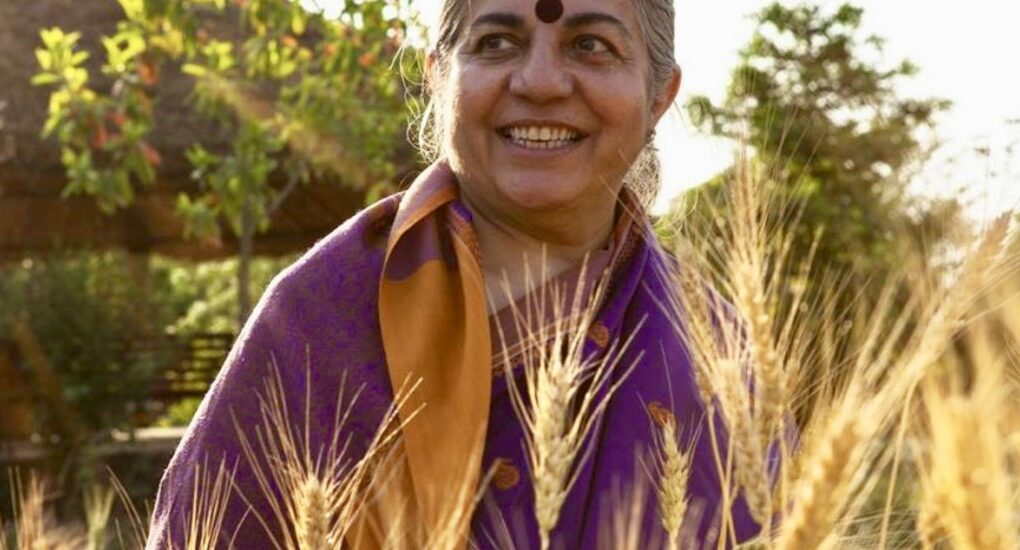Social activist, scientist and ecofeminist
Author: Claudia Nussbaumer
Vandana Shiva (* November 5, 1952 in Dehradun) is not only a scientist, social activist and globalization critic. She is as well author of numerous books and phrases criticism on agriculture. For her commitment to environmental protection, biodiversity, women’s rights and sustainability she won many awards. Among other things the Right Livelihood Award – unofficially also called the Alternative Nobel Prize – in 1993 for placing the issues of feminism and ecology at the center of the discourse on modern development policy. She is a member of the Club of Rome and the International Organization for a Participatory Society (IOPS), among others. Furthermore, she is a member of the World Future Council.
Ecofeminism
Part of her work is ecofeminism. On this she published a book of the same name in 1993. Together with Maria Miles, she examined the connection between patriarchal society and environmental destruction. In doing so, they emphasize that it is important to view the value of nature. Not in terms of financial values, as some male representatives of industry do, but as fundamentally important. In doing so, they define male-driven values and how they lead to ecological destruction, exploitation, and militarism. Furthermore, feminine ecological values are also defined in turn. According to the theory of ecofeminism, the millennia-old patriarchal society is based on hierarchies and competition. Success is measured by the extent of individual gain, not by the general common good.
Genetic engineering, Shiva calls ‘colonialism of plants, animals and people’, as multinational corporations increasingly seize control of life. She attributes this process to patriarchal values. The male-centered concept of power needs reinvention and also a different definition.
The previous meaning of power, oriented towards dominance, control and domination, must be changed into an inner power. A power that opposes all forms of oppression, encourages and does not enrich itself at the expense of others.
Critics of ecofeminism view Shiva and Mies’ assumption that there is a special privileged relationship between women and nature. They say that women’s relationship to nature is one of the necessary qualities of women as essentialist from a poststructuralist viewpoint. In her book “Prophets Facing Backward: Postmodern Critiques of Science and Hindu Nationalism in India (2003),” Meera Nanda criticized the equation of nature with a nurturing mother as ignoring the oppression of women through this image.
GLOBALIZATION CRITICISM
Vandana Shiva commits particularly to opposing the advancing monopoly of transnational corporations. Especially those that seek to have an increasing influence on Indian agriculture. She sees the farmers who engage with her as followers of the anti-imperialist tradition of Mahatma Gandhi. This is visible through the continued use of the slogan ‘Quit India’, which was originally directed at the English colonizers, but is now directed at genetic engineering companies such as Monsanto and Recetec. She also criticizes the patent thinking of these corporations, which is now being applied to developing countries and leading to the patenting of traditional and indigenous plants.
She sees their supposed motive to satisfy world hunger through genetic engineering as a pretext for world market economy. Based on this criticism, she managed, with the help of her institute The Research Foundation for Science Technology and Ecology, the International Federation of Organic Agriculture and other movements, to raise an objection at the European Patent Office (EPO) against the granting of a patent on the oil of the neem tree seed to the Grace company. In 2005, the EPO finally rejected the patenting.
In addition, she developed an alternative to neoliberal globalization. This she calls ‘Earth Democracy’. It is based on ten principles, which base essentially on the ‘intrinsic common value’ of all species, peoples and cultures, which must be respected.
Vandana Shiva is also an active participant in the public debate on the climate crisis. She co-signed an open letter calling for joining movements such as Extinction Rebellion and for consumerism. In addition, it addresses the fact that politics has failed so far to come up with sufficient measures to combat the climate crisis.
Agriculture
Another area of interest for Shiva is agriculture. She began primarily with her criticism of the ‘Green Revolution’ in India, which had a strategy of bringing farmers in developing countries into the world market for fertilizers, seeds and pesticides. However, in Shiva’s opinion, this led to ecological and cultural uprooting. Meaning the fragility of the peasants’ connection to the soil and the community. This can be seen, first, in the religious uprisings in the state of Punjab, which resulted in numerous deaths, and, second, in the Bhopal disaster, in which a chemical factory owned by the U.S. company Union Carbide, which produced pesticides and released several tons of poison gas, killed several thousand people. She directed further criticism against the accompanying commercialization of agriculture and the disintegration that goes with it. Consequences of this include disease-prone monocultures and hybrid crops.
Shiva’s goals are to keep native seeds freely available to village communities, not to use chemicals, and to locate agriculture locally, i.e. to see it as a community property.
Multinational corporations should not own agriculture.
These were not bad intentions, but the Liberty Institute India criticized them nevertheless. The criticism directed at their opposition to genetic engineering in agriculture and defense of traditional organic forms of agriculture. The latter, until the beginning of the Green Revolution in the 1960s, had regularly led to famine for a tenth of India’s population.
 Vandana Shiva
Vandana Shiva
Another aspect of Shiva’s socio-agricultural position was faced with criticism when she expressed the view that transgenic cotton, with its higher price and annual repurchase of seeds, led to the indebtedness of thousands of farmers and their suicide. She spoke of a ‘genocide’ of 270,000 Indian farmers. However, according to political scientist Ronald Herring1 , it spread misinformation in this context. The suicide rate among peasants remained relatively constant during the relevant period from 1997 to 2009, declining steadily from the initial 18000 to 12000 suicides per year in 2016.
Despite this criticism, Shiva got the Time magazine’s “Hero of the Green Century” title in 2002. Specifically for her advocacy of independent seeds.
CRITICISM OF MULTINATIONAL CORPORATIONS
In several interviews, Vandana Shiva calls for a fight against the top one percent of people in order to stop climate change and stand up for social justice. This includes her criticism of multinational corporations, arguing that they often have no home, loyalty or responsibility to citizens and operate in tax havens.
She developed the concept of the ‘money machine’ in this these corporations create and accumulate money. Property rights and patents are central to this, as they function like a rent collection system. Corporations use their growing power to support politicians who represent their values and thus lobby for change in the tax system to obtain tax exemptions for them.
FOUNDATIONS
In 1991, she founded the organization Navdanya, which means “nine states” or “nine seeds.” Symbolically, this name wants to refer to the diversity and protection of biological seeds. The network consists of several local communities and Indian organizations. It works to protect and preserve regional and traditional seeds by collecting seeds and growing them on an experimental farm. In doing so, they intend to protect these varieties from extinction and promote organic farming practices. They also protect farmers from dependence on patented seeds, and provide food for the local population by strengthening local markets. To this end, Navdanya established forty seed libraries in thirteen Indian states. Parallel to this she offers parallel courses on organic farming practices for farmers. 70,000 farmers are members of the organization.
In 2001, Shiva also founded the Bija Vidyapeeth school and farm. The school offers courses on topics such as biodiversity and organic farming. It also covers the philosophy of Mahatma Gandhi and human rights in the face of growing globalization.
Footnotes:
1) Source: https://www.sciencedirect.com/science/article/pii/S1871678410004528
This article was originally published on the German Homepage of Tattva Viveka: Portrait über Vandana Shiva




